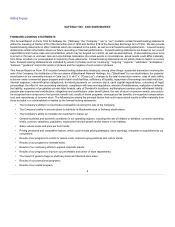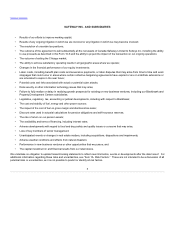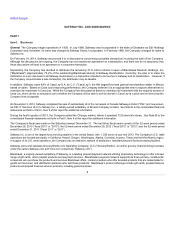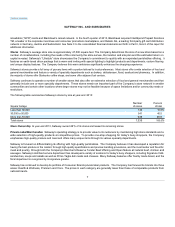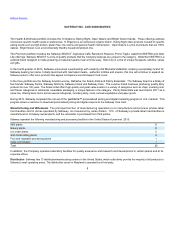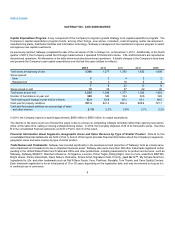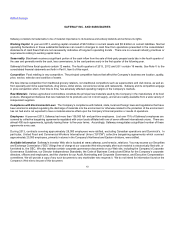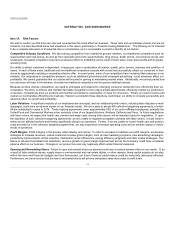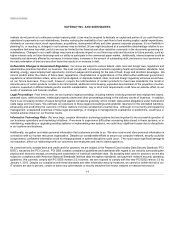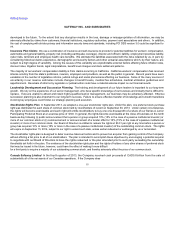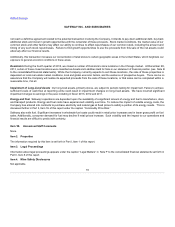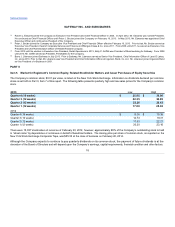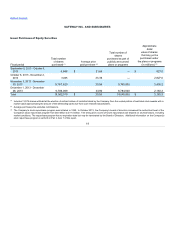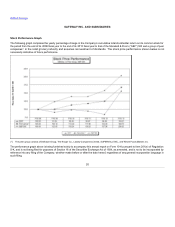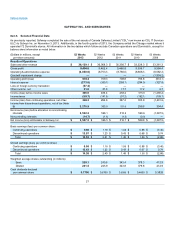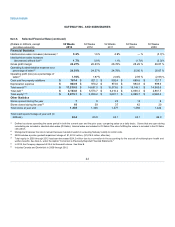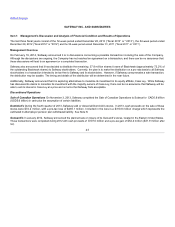Safeway 2013 Annual Report Download - page 14
Download and view the complete annual report
Please find page 14 of the 2013 Safeway annual report below. You can navigate through the pages in the report by either clicking on the pages listed below, or by using the keyword search tool below to find specific information within the annual report.
Table of Contents
markets do not permit us to refinance certain maturing debt: (i) we may be required to dedicate an unplanned portion of our cash flow from
operations to payments on our indebtedness, thereby reducing the availability of our cash flow to fund working capital, capital expenditures,
dividends on common stock, stock repurchases, acquisitions, development efforts and other general corporate purposes; (ii) our flexibility in
planning for, or reacting to, changes in our business may be limited; (iii) we might be placed at a competitive disadvantage relative to our
competitors that have less debt; and (iv) we may be limited by the financial and other restrictive covenants in the documents governing our
indebtedness. Changes in our credit ratings may have an adverse impact on our financing costs and structure in future periods, such as
higher interest costs on future financings and our ability to participate in the commercial paper market. Additionally, interest expense could be
materially and adversely affected by increases in interest rates, increases in the amount of outstanding debt, decisions to incur premiums on
the early redemption of debt and any other factor that results in an increase in debt.
Unfavorable Changes in Government Regulation Our stores are subject to various federal, state, local and foreign laws, regulations and
administrative practices that affect our business. We must comply with numerous provisions regulating health and sanitation standards, food
labeling, energy, equal employment opportunity, minimum wages and licensing for the sale of food, drugs and alcoholic beverages. We
cannot predict either the nature of future laws, regulations, interpretations or applications, or the effect either additional government
regulations or administrative orders, when and if promulgated, or disparate federal, state, local and foreign regulatory schemes would have
on our future business. They could, however, require the reformulation of certain products to meet new standards, the recall or
discontinuance of certain products not able to be reformulated, additional record keeping, expanded documentation of the properties of certain
products, expanded or different labeling and/or scientific substantiation. Any or all of such requirements could have an adverse effect on our
results of operations and financial condition.
Legal Proceedings From time to time, we are a party to legal proceedings, including matters involving personnel and employment issues,
personal injury, antitrust claims, intellectual property claims and other proceedings arising in the ordinary course of business. In addition,
there is an increasing number of cases being filed against companies generally, which contain class-action allegations under federal and
state wage and hour laws. We estimate our exposure to these legal proceedings and establish reserves for the estimated liabilities.
Assessing and predicting the outcome of these matters involves substantial uncertainties. Although not currently anticipated by
management, unexpected outcomes in these legal proceedings, or changes in management’s evaluations or predictions, could have a
material adverse impact on our financial results.
Information Technology Risks We have large, complex information technology systems that are important to the successful operation of
our business operations and marketing initiatives. If we were to experience difficulties accessing data stored in these systems, or in
maintaining, expanding or upgrading existing systems or implementing new systems, we could incur significant losses due to disruptions
in our systems and business.
Additionally, we gather and retain personal information that customers provide to us. We also receive and store personal information in
connection with our human resources organization. Despite our considerable efforts to secure our computer network, security could be
compromised, confidential information could be misappropriated or system disruptions could occur. This could cause significant damage to
our reputation, affect our relationships with our customers and employees and lead to claims against us.
As a merchant who accepts debit and credit cards for payment, we are subject to the Payment Card Industry Data Security Standard (“PCI
DSS”), issued by the PCI Council. PCI DSS contains compliance guidelines and standards with regard to our security surrounding the
physical and electronic storage, processing and transmission of individual cardholder data. By accepting debit cards for payment, we are also
subject to compliance with American National Standards Institute data encryption standards, and payment network security operating
guidelines. We currently comply with PCI DSS version 2.0; however, we are required to comply with the new PCI DSS version 3.0 by
January 1, 2015. Despite our compliance with these standards and other information security measures, we cannot be certain that all of our
IT systems are able to prevent, contain or detect any cyber-attacks or security breaches from known malware or malware that may be
14


